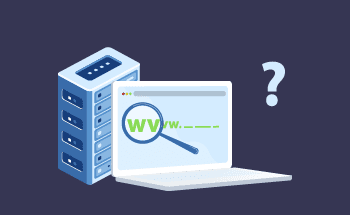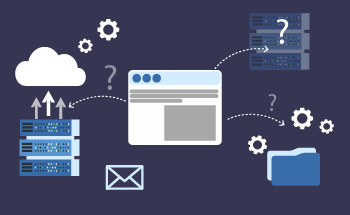What is a data center, how it is arranged: the advantages of placing a server in a data center for business
07:47, 11.10.2021
Most businesses tend to locate their servers in data centers. The demand for such services is constantly growing. In this article, let's find out what a data center is and why it is a popular option for hosting business servers.
What is a data center and what’s in it?
A data center is a separate, specialized building with networking/server equipment housed in it. Without such centers, the Internet would not exist, because that is where most of the information available on the Web is stored. A data center is a technological facility designed to provide the necessary conditions for the operation of network infrastructure:
- Uninterrupted supply of electricity;
- High-speed and stable connection to the Internet;
- Equipment cooling;
- The required security conditions.
Such data centers play a key role in the operation of the Internet on a par with telecommunications operators, because no online service is able to fully operate without servers.
Classification of data centers according to the level of reliability and security
In terms of data storage security and reliability, all data centers are divided into 4 levels according to the international classification developed by the Uptime Institute organization:
- Tier 1 is a basic tier that guarantees 99.67% operational stability of the equipment and a certain level of information storage security. It is a rather outdated and unpopular standard because it does not provide for data backup and an uninterruptible power supply.
- Tier 2 is a standard that guarantees 99.75% uninterrupted operation of equipment and provides a higher level of data storage security. Such data centers are able to guarantee an uninterrupted power supply on a continuous basis. They are equipped with advanced server cooling equipment and provide excess system resources to meet the needs of a particular customer.
- Tier 3 data centers have a 99.98% availability and security rating. There is mandatory redundancy of all systems, so such data centers operate without interruption. The main advantage of such data centers is the ability to maintain them without shutting down (Concurrently Maintainable), and they are also necessarily equipped with redundant components and several independent distribution channels that serve the IT load.
- Tier 4 is a standard that provides a maximum level of hardware fault tolerance and storage security of 99.99% by having several systems isolated from each other. These data centers have complete redundancy of all life-support systems and double redundancy of stored information.
Types of data centers and list of services provided
According to the type of use data centers are divided into two types:
- Outsourced - providing services to various companies and individuals.
- Corporate - providing services exclusively to specific companies.
What services data centers provide to their customers
Basically, the function of data centers is to provide commercial companies, legal entities, and individuals with access to existing, established, and stable infrastructure. This is the so-called colocation - rental of data center space for server placement of a user (customer) under the stipulated tariff. Providers place their equipment in data centers, and they, in turn, provide various services to private companies and organizations:
- Virtual server rental (VPS) - provides a virtual server for rent with the ability to install any available software, including the operating system;
- Dedicated server rental - a separate type of hosting, which provides the ability to place sites, applications, and any other projects on a separate physical machine.
The data center itself serves only for data storage and processing, as well as physical customer equipment.
Why servers are placed in a data center
At a certain stage of functioning and development, every company engaged in business needs to upgrade and strengthen the IT infrastructure. This requires the installation of a new or modernization of an existing server, which entails:
- Searching for and paying for the services of appropriate personnel;
- The cost of purchasing, installing, and maintaining the equipment;
- Construction or allocation of a separate room.
Why do businesses prefer to keep their servers in the data center?
As any company grows, the number of business operations increases. There is a need to store large amounts of data, the volume of which grows linearly over time. At the same time, it is important to control the entire technological infrastructure - for its effective, uninterrupted functioning and safety of information storage. Accordingly, you need your own server. For this, you have to buy expensive equipment, attract qualified specialists, which entails large financial expenses.
Placing servers in a data center is the best way to ensure uninterrupted access to any information and guarantee data security. It completely eliminates the risk of server downtime and reduces the administrative costs of purchasing and maintaining equipment, as all data centers guarantee:
- Reduced energy costs. When running a local server, it can consume up to 1200 W/hour, and the company will have to pay the electricity bill itself, which will lead to additional administrative costs. If a company enters into a contract with a data center to host a server, all of these costs are included in the hosting fee, and eventually, it comes out cheaper.
- Ensuring optimal conditions for uninterrupted operation of equipment. The data center is not just a building or room where servers are located. The creation of a data center involves the allocation of additional rooms for the installation of systems and equipment to ensure optimal server temperature - 20-22℃.
- Data security. When placing a server in the data center, the client gets a full guarantee of security for the information stored on it. All data center buildings and facilities are protected against unauthorized intrusion. Each data center has its own security service and staff constantly monitoring for any unauthorized activity.
- High bandwidth. When setting up your own server, not every company is able to provide high bandwidth speeds, as local providers are not able to provide a stable high-speed connection to the network. Because of this, there can often be delays in connecting to the server or a lack of speed. Data Center guarantees high network speed, up to tens of gigabits, which allows you to support large amounts of traffic and avoid the risk of server outages under heavy loads.
The data center guarantees the uninterrupted operation of equipment and information security. In the event of a power outage, all servers are automatically switched to backup power, and automated fire suppression systems are installed in data centers to protect the equipment.


